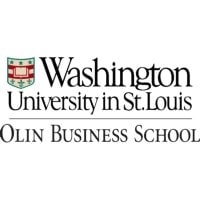A student and fellow MSFHQ reader provided me with a review of the Master in Finance program at Washington University in St. Louis. It is one of the more popular master in finance programs so I hope the review helps those trying to decide on the program.
1) Why an MSF in general and why did you choose WUSTL in particular?
I was attracted to an master in finance degree early on in my undergraduate studies. I studied math and economics and found quantitative finance and financial markets to be fascinating areas of application to my liberal arts interests. The MSF program at Wash U appealed to me for two reasons. The program offered a very quantitative curriculum, including the math foundations needed to understand asset and derivative pricing, and the program also offered courses in corporate finance. While I was most interested in the quantitative courses, the more MBA-like corporate finance classes were valuable to gain broader knowledge and perspective in finance.
2) Who would you recommend a WUSTL Master in Finance for?
I would recommend Wash U’s master in finance program for someone with a quantitative background, who studied math, physics, or engineering as and undergrad. Having a little knowledge of economics is also helpful but probably less important than an aptitude for math. While some people may disagree, I think the economic intuition is easier to pick up on the go than the mathematical and computer programming foundations.
3) Pros and Cons of the degree/school.
Pros:
– Excellent faculty that values teaching and accessibility
– Excellent advisers and admissions team that are willing to go the extra-mile for the students.
– Balanced curriculum that offers quantitative courses with broader classes in corporate finance
Cons:
– My feeling is that many employers still don’t know how to recruit and utilize MSF students. Master in finance students have a stronger quantitative skill set than an undergraduate or MBA student but typically lack the experience of an MBA student. I think that as these types of programs become more understood this issue will be less problematic. I was enrolled in the program during a tough period for placement in finance (2009), and those difficulties may have shaped my view on placements. I hear that, in the last graduating class, everyone was placed within 90 days of graduation, which is phenomenal given that it is still a tough hiring environment.
4) Anything else you would like to comment on.
I really enjoyed my time in St. Louis at Wash U. The campus is wonderful and there are plenty of housing options around (and cheap looking back on it!). The city also offers plenty of attractions when trying to get away from studying. The city offers sports teams, nice bars and restaurants, cool neighborhoods and an enormous park right next to campus.
I have emphasized the blend of the quantitative course with broader corporate finance classes, but it is worth mentioning that since I graduated the coursework has been split into two tracks – a quant track and corporate finance track. I think that this was an excellent decision, and will help students develop an even deeper skill set in the areas they are interested. Still, it looks like there is enough overlap in each track so that students in each track gain the wider knowledge.
Click here for more information on the Washington University – St. Louis Master in Finance Program.



